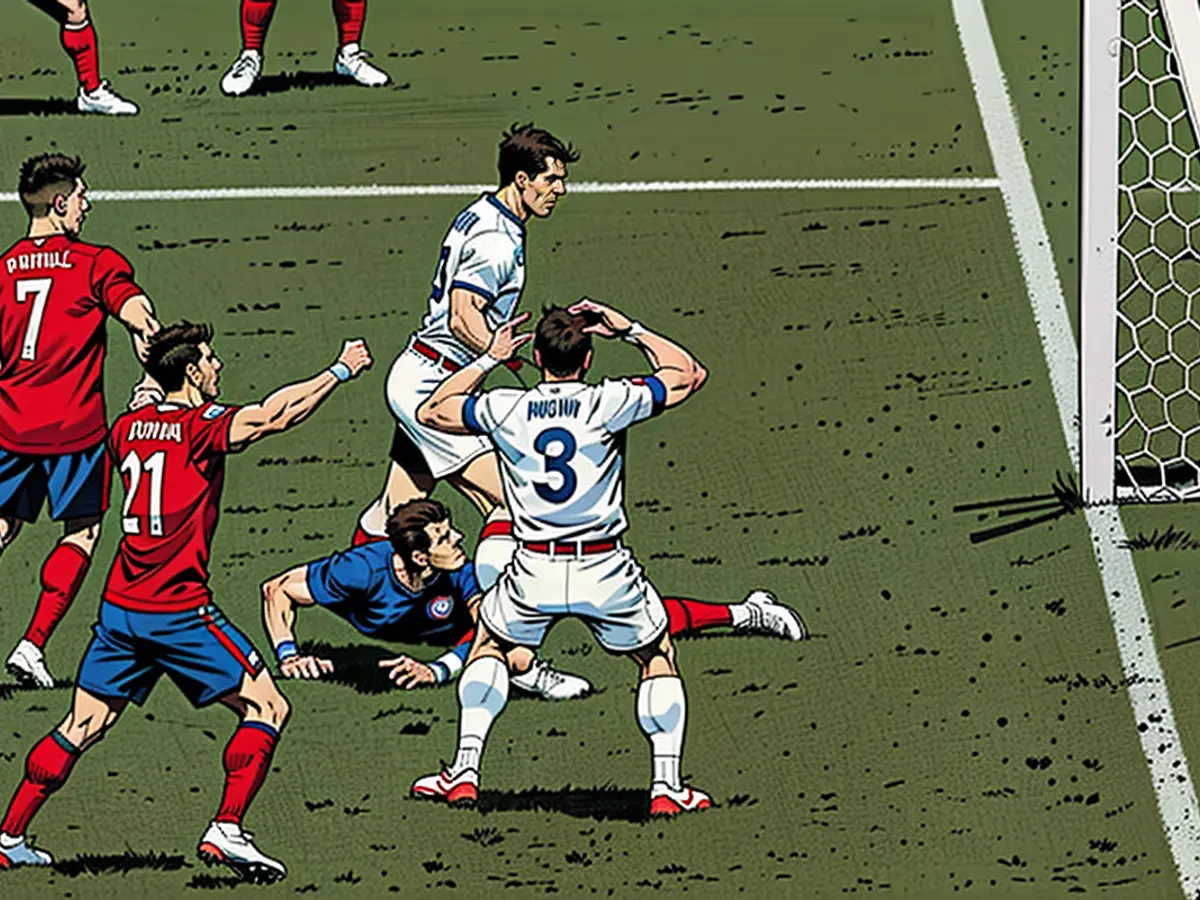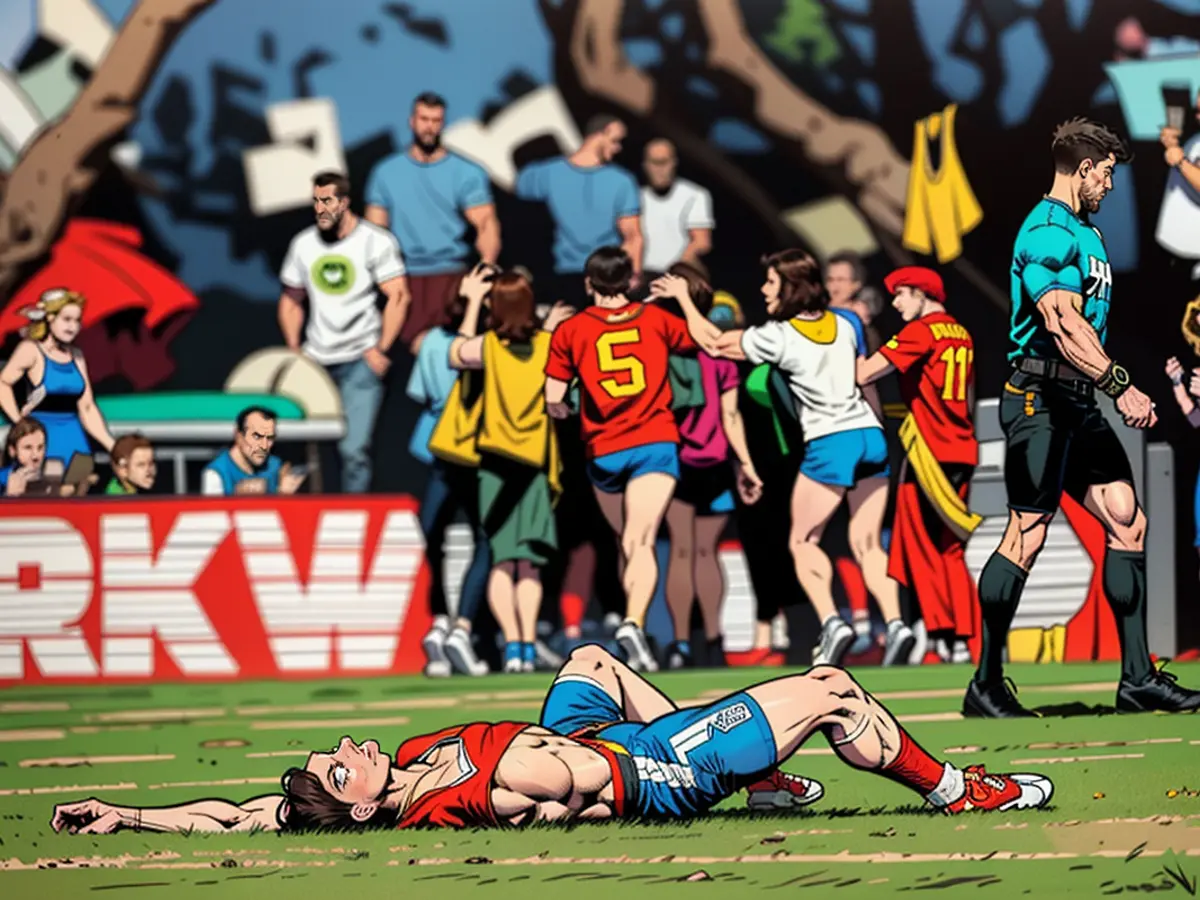EM 2024:European Football Championship 2024 - The tournament of great creation
Tobias Escher is Co-Founder of the Internet-Site Spielverlagerung.de, where various topics around football tactics are discussed. As one of the renowned experts in this field, he writes for various media.
Here, he looks back at the Euro 2024 with nine observations – from tired players to the flood of own goals, up to the young stars who shaped this tournament.
The Mood was Good, but the Grand Football Spectacle was Missing
Full stadiums, full fan miles: The atmosphere at this tournament was magnificent. Sadly, the football was not always. Most teams acted defensively. On average, there were only 2.28 goals per game until the final – a decrease of 0.5 compared to the previous tournament. In both semifinals, there were a total of 15 goals. These are very low values. One reason: the tournament format. In the group stage, even the best third-placed teams advance, with three draws sufficing. There's no pressure to win.
In the knockout stage, there's the option for penalty shootouts in extra time, while recovering from a deficit is difficult. Consequence: risk minimization, deep defensive lines, no high pressing – no attractive football. Top nations like England, France, but also Belgium, acted cautiously. Even the Netherlands showed no trace of their former attacking football. However, there was also the offensive faction: Spain, Germany, and sometimes Turkey – and the surprise team from Austria.
Euro 2024 was the Tournament of Great Invention
Swollen competitions, more games, especially for top clubs – towards the end of the season, many players are at the end of their physical and mental strength. And they were driven into an EURO in this condition. Between the Champions League final in early June and the German opening match, there were no more than two weeks. You can't expect grand presentations under these circumstances.
Florian Wirtz had a fantastic season in the Bundesliga and also a mediocre EURO – but not a truly great one. England's Harry Kane had to be substituted in the semifinal ten minutes before the end despite the possibility of extra time because he was exhausted. Many matches turned into endurance and wear-and-tear battles instead of football festivals – also because the trainers reacted to the circumstances: safety instead of risk, simple concepts instead of tactical finesse, minimizing deficits as much as possible.
Man-marking is suddenly fashionable again
For years, man-marking was considered outdated and uncreative: Each player was assigned a specific opponent to mark throughout the entire game. Anyone who wanted to make a name for themselves as a coach opted for zonal marking, where players were responsible for specific zones on the field. Surprisingly, at this EURO, there was a retro trend. Germany played a man-marking system over the entire field against Spain in the quarterfinals. Switzerland shocked Italy in the round of 16 with man-marking and knocked them out of the tournament. The Turkish team also provoked many man-to-man duels.
The respective opponents caused great problems for us. When I give an example of man-marking, I need a lot of movement: I have to keep constantly outmaneuvering and distracting individual defenders to get them out of the defensive line, so that my teammates can quickly occupy the vacated spaces. This requires a lot of effort – and could be the key to the revival of man-marking. Goal: To put pressure on the opponent and exhaust them at the end of a long, energy-sapping season.
Modern football is like "Starbucks": There are many branches. But they all look the same
Globalization levels out national particularities and cultural differences. This is also true for football, especially since many players now play in very few European top leagues in England, Spain, Germany, or Italy. Nearly every team at this EM has adopted the same tactical setup, which the Spanish coach master Pep Guardiola taught: with three defenders and one or two midfielders in front.
There is a great uniformity of approaches – the "Starbuckization" of football: different branches, but it looks the same everywhere. You can no longer tell at first glance: This must be a Belgian, Czech, or Romanian team. Germany no longer plays typical German football either, but – thankfully – the modern, globalized football that almost everyone plays.
The most important tactical innovation: Full-backs become key players
Offensive full-backs have been around for a long time, but their role was redefined at this tournament. Together with a retreating midfielder and the respective winger, the full-back forms a triangle, in which it is possible to free the winger through quick passing combinations, allowing him to then deliver precise crosses into the penalty area without pressure. If one side is thus overloaded offensively, the opponent must react and shift his players in that direction. With a quick diagonal pass to the other, then exposed side, the game can be opened up wonderfully.

Or, also frequently seen at the EM: The full-back suddenly dribbles with the ball inwards, disrupting and confusing the defensive line. Either the full-back then looks for his winger again or he plays a short, deadly through ball to the central defense or he goes for the goal himself from the penalty area. This variety of options was not available before, as offensive full-backs used to stick stubbornly to the outside line. The Spaniards (with Cucurella, Olmo, and Williams) and the English (with Walker, Saka, and Foden) perfected this tactical ploy. Both may have reached the final for this reason.
The shot from a distance was rediscovered
In the group stage, every fifth shot from a distance was an effort from outside the penalty area. That's much more than in the Bundesliga, where roughly one in ten shots from a distance are taken. For years, it was fashionable to combine meticulously with short passes right up to the "box," as close as possible to the opponent's goal, which makes sense statistically, as it takes a lot of attempts for a goal to occur from long-range shots. But national teams lack the training time that club teams have to ingrain automatisms. The long shot is a reliable option when no other solutions can be found in the final third before the opponent's goal.
Coming up: Defense formations are not as well-practiced during tournaments as they are in everyday league operation. A typical example: Xavi Simons' hammer shot for the Dutch 1:0 lead against England in the semifinals. In the Bundesliga, a defender would have immediately been pushed back to block the shot. Against England, Simons had a clear path. And: the collective creativity may also play a role here. When forces no longer suffice, energy-consuming attacking efforts are doubtfully resolved earlier through long-range shots.
Own goals pile up
Not a new trend, as there was a flood of own goals during the last European Championship. Around 70 percent of all own goals scored at European Championships since 1960 have occurred in the last three tournaments, with more games per EM than before. Why so many own goals? Often, this was the scene: a low or half-height cross into the penalty area, very sharply shot, defender not properly oriented – and the ball ends up in their own net.
Perhaps own goals have now become part of the tactical arsenal and are deliberately provoked. First, I'll split the defense apart, then the sharp through-ball. If the defenders don't know for sure if there's an attacker lurking behind them, they have to clear the ball somehow – and right in the middle of their forward movement towards their own goal. Thus, the classic own goal of this EM is born. And such situations can be engineered.
It wasn't the tournament of the strikers
No classic strikers stood out. Of course, Kai Havertz and Niclas Füllkrug scored – but overall, it wasn't the tournament of the strikers. Classical penalty box strikers like Füllkrug, the Dutch Wout Weghorst, or the French Olivier Giroud, were often brought on late and in desperation. Harry Kane played deep for England, often in midfield positions usually reserved for a "10" or even a "6," like Toni Kroos. Even Morata moved up front for Spain.
The goalscoring came from this EM more from midfield, from players who suddenly pushed forward like Musiala (Germany), Rodri (Spain), Belllingham (England) – or even from the full-backs. Few teams attempted to feed their strikers in the penalty area with crosses. The motto was rather: high crosses only when others are knocked out, or when we're running out of time – in the final stages of the game.
Ronaldo and Co. step aside – the "Jugend forscht" generation takes over
Cristiano Ronaldo, Pepe, Luka Modrić, Toni Kroos – the big, old names of football wanted to leave their mark on the tournament once more. And they had to make way, often with tears. This EM was a triumph for the young generation. The Spanish wing duo with Lamine Yamal (16) and Nico Williams (21): youthful recklessness combined with determination in front of the goal.
Jude Bellingham, rarely shining, but crucial for England: just turned 21. His teammate on the right wing, Bukayo Saka: 22 years old. The Spanish Dany Olmo, match-winner against Germany: with 26 in the prime football age. The "Jugend forscht" generation set the highlights of this EM – and pushed the old guard aside.
Recorded by stern-author Tilman Gerwien.
- Despite England's reputable status in soccer, they struggled in the Euro 2024 tournament, with their star player, Harry Kane, being substituted due to exhaustion further into the semifinal due to exhaustion from a packed schedule.
- Spain and Germany, two countries known for their strategic approach to soccer, relied on man-marking tactics during the Euro 2024, showing a shift in tactics and a return to the former defensive method.
- Surprisingly, own goals became more common in the Euro 2024 tournament than in previous years, with some teams seemingly exploiting this tactic to confusion and misorientation among the opposing defenders.









